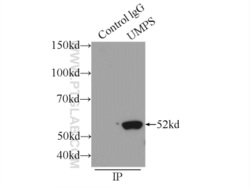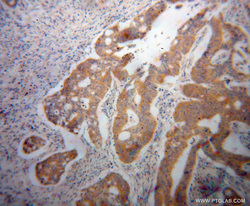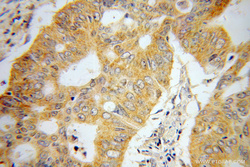Antibody data
- Antibody Data
- Antigen structure
- References [8]
- Comments [0]
- Validations
- Western blot [1]
- Immunoprecipitation [1]
- Immunohistochemistry [2]
Submit
Validation data
Reference
Comment
Report error
- Product number
- 14830-1-AP - Provider product page

- Provider
- Proteintech Group
- Proper citation
- Proteintech Cat#14830-1-AP, RRID:AB_2212392
- Product name
- UMPS antibody
- Antibody type
- Polyclonal
- Description
- UMPS antibody (Cat. #14830-1-AP) is a rabbit polyclonal antibody that shows reactivity with human, mouse and has been validated for the following applications: IHC, IP, WB,ELISA.
- Reactivity
- Human, Mouse
- Host
- Rabbit
- Conjugate
- Unconjugated
- Isotype
- IgG
- Vial size
- 20ul, 150ul
Submitted references Hypoxanthine phosphoribosyl transferase 1 metabolizes temozolomide to activate AMPK for driving chemoresistance of glioblastomas.
De novo pyrimidine biosynthetic complexes support cancer cell proliferation and ferroptosis defence.
Oxoglutarate dehydrogenase-like inhibits the progression of hepatocellular carcinoma by inducing DNA damage through non-canonical function.
Immunohistochemical validation study of 15-gene biomarker panel predictive of benefit from adjuvant chemotherapy in resected non-small-cell lung cancer: analysis of JBR.10.
Macrophage-Released Pyrimidines Inhibit Gemcitabine Therapy in Pancreatic Cancer.
Coordinative metabolism of glutamine carbon and nitrogen in proliferating cancer cells under hypoxia.
Erlotinib plus capecitabine as first-line treatment for older Chinese patients with advanced adenocarcinoma of the lung (C-TONG0807): an open-label, single arm, multicenter phase II study.
Prognostic significance of thymidylate synthase in postoperative non-small cell lung cancer patients.
Yin J, Wang X, Ge X, Ding F, Shi Z, Ge Z, Huang G, Zhao N, Chen D, Zhang J, Agnihotri S, Cao Y, Ji J, Lin F, Wang Q, Zhou Q, Wang X, You Y, Lu Z, Qian X
Nature communications 2023 Sep 22;14(1):5913
Nature communications 2023 Sep 22;14(1):5913
De novo pyrimidine biosynthetic complexes support cancer cell proliferation and ferroptosis defence.
Yang C, Zhao Y, Wang L, Guo Z, Ma L, Yang R, Wu Y, Li X, Niu J, Chu Q, Fu Y, Li B
Nature cell biology 2023 Jun;25(6):836-847
Nature cell biology 2023 Jun;25(6):836-847
Oxoglutarate dehydrogenase-like inhibits the progression of hepatocellular carcinoma by inducing DNA damage through non-canonical function.
Jiang X, Peng J, Xie Y, Xu Y, Liu Q, Cheng C, Yan P, Xu S, Wang Y, Zhang L, Li H, Li Y, Li B, Han J, Yu D
Cell death and differentiation 2023 Aug;30(8):1931-1942
Cell death and differentiation 2023 Aug;30(8):1931-1942
Immunohistochemical validation study of 15-gene biomarker panel predictive of benefit from adjuvant chemotherapy in resected non-small-cell lung cancer: analysis of JBR.10.
Grieve S, Ding K, Moore J, Finniss M, Ray A, Lees M, Hossain F, Murugesan A, Agar J, Acar C, Taylor J, Shepherd FA, Reiman T
ESMO open 2020 Mar;5(2)
ESMO open 2020 Mar;5(2)
Macrophage-Released Pyrimidines Inhibit Gemcitabine Therapy in Pancreatic Cancer.
Halbrook CJ, Pontious C, Kovalenko I, Lapienyte L, Dreyer S, Lee HJ, Thurston G, Zhang Y, Lazarus J, Sajjakulnukit P, Hong HS, Kremer DM, Nelson BS, Kemp S, Zhang L, Chang D, Biankin A, Shi J, Frankel TL, Crawford HC, Morton JP, Pasca di Magliano M, Lyssiotis CA
Cell metabolism 2019 Jun 4;29(6):1390-1399.e6
Cell metabolism 2019 Jun 4;29(6):1390-1399.e6
Coordinative metabolism of glutamine carbon and nitrogen in proliferating cancer cells under hypoxia.
Wang Y, Bai C, Ruan Y, Liu M, Chu Q, Qiu L, Yang C, Li B
Nature communications 2019 Jan 14;10(1):201
Nature communications 2019 Jan 14;10(1):201
Erlotinib plus capecitabine as first-line treatment for older Chinese patients with advanced adenocarcinoma of the lung (C-TONG0807): an open-label, single arm, multicenter phase II study.
Zhao HY, Chen GY, Huang Y, Li XL, Feng JF, Shi MQ, Cheng Y, Ma LX, Zhang YP, Gu CP, Song XQ, Zhou D, Zhang L
Medicine 2015 Jan;94(2):e249
Medicine 2015 Jan;94(2):e249
Prognostic significance of thymidylate synthase in postoperative non-small cell lung cancer patients.
Zhao HY, Ma GW, Zou BY, Li M, Lin SX, Zhao LP, Guo Y, Huang Y, Tian Y, Xie D, Zhang L
OncoTargets and therapy 2014;7:1301-10
OncoTargets and therapy 2014;7:1301-10
No comments: Submit comment
Supportive validation
- Submitted by
- Proteintech Group (provider)
- Main image

- Experimental details
- HeLa cells were subjected to SDS PAGE followed by western blot with 14830-1-AP(UMPS antibody) at dilution of 1:400
- Sample type
- cell line
Supportive validation
- Submitted by
- Proteintech Group (provider)
- Main image

- Experimental details
- IP Result of anti-UMPS (IP:14830-1-AP, 3ug; Detection:14830-1-AP 1:500) with HEK-293 cells lysate 1700ug.
- Sample type
- cell line
Supportive validation
- Submitted by
- Proteintech Group (provider)
- Main image

- Experimental details
- Immunohistochemical of paraffin-embedded human colon cancer using 14830-1-AP(UMPS antibody) at dilution of 1:100 (under 10x lens)
- Sample type
- tissue
- Submitted by
- Proteintech Group (provider)
- Main image

- Experimental details
- The UMPS antibody from Proteintech is a rabbit polyclonal antibody to a recombinant protein of human UMPS. This antibody recognizes human,mouse,rat antigen. The UMPS antibody has been validated for the following applications: ELISA, WB, IHC, IP analysis.
 Explore
Explore Validate
Validate Learn
Learn Western blot
Western blot ELISA
ELISA